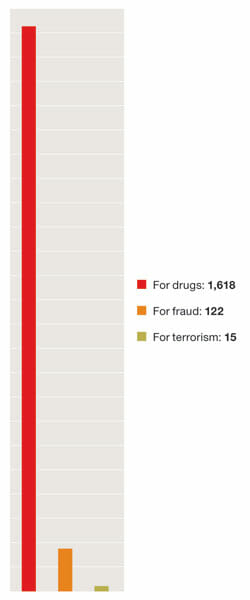Several of the amendments in the Bill of Rights, notably the second and the tenth, are no longer treated by many folks as "real." Just old TJ kidding around.
Over the last several years, I have worried that the Fourth Amendment is rapidly heading in the same direction. This week has been a bad week.
First up, today's decision that if cops have some reason to think valuable evidence is being destroyed, they can bust down your door without a warrant. Toilet flush? Must be getting rid of drugs. Can be seen in the window at the computer? Must be deleting child porn. Silence? Must be destroying evidence really quietly.
Think I am exaggerating? Here are the facts of the case:
It began when police in Lexington, Ky., were following a suspect who allegedly had sold crack cocaine to an informer and then walked into an apartment building. They did not see which apartment he entered, but when they smelled marijuana smoke come from one of the apartments, they wrongly assumed he had gone into that one. They pounded on the door and called "Police. Police. Police," and heard the sounds of people moving.
At this, the officers announced they were coming in, and they broke down the door. They found Hollis King smoking marijuana, and put him under arrest. They also found powder cocaine. King was convicted of drug trafficking and sentenced to 11 years in prison.
Sounds of people moving in apartment = break the door down, no warrant needed. This is just a joke, though I must also say the drug war has already gutted any number of Constitutional protections, so its not surprising to see yet another blow to liberty in the name of rounding up anyone who might be smoking a joint. (more here)
The other case is perhaps even more egregious, and comes from Indiana, where the state Supreme Court decided that citizens must defer to agents of the state, even when those agents are violating the law. In particular, if a cop wants to enter your house for no reason at all without a warrant, you can't resist.
"We believe … a right to resist an unlawful police entry into a home is against public policy and is incompatible with modern Fourth Amendment jurisprudence," David said. "We also find that allowing resistance unnecessarily escalates the level of violence and therefore the risk of injuries to all parties involved without preventing the arrest."
David said a person arrested following an unlawful entry by police still can be released on bail and has plenty of opportunities to protest the illegal entry through the court system.
Escalation of violence is a two-way street. Why is the homeowner, the innocent party, the one who is made legally responsible for such escalation? Why isn't it the agent of the state who is responsible for any such escalation? And while a homeowner may have plenty of opportunities to protest illegal entry after the fact (though this is debatable in real life) I would argue that the police officer had plenty of opportunities before the fact to get a freaking warrant.
